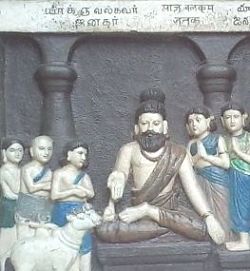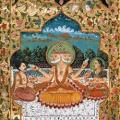4. Hide and Seek: The Upanisads
Posted on
The ancient texts known as the Upaniṣads claim to expose the hidden connections between things, including the self and the world.
Themes:
Further Reading
• P. Olivelle (trans.), Upaniṣads (Oxford: 1996).
• B. Black, “The Upaniṣads,” in the Internet Encyclopedia of Philosophy.
• J. Brereton, “The Upaniṣads,” in W.T. de Bary and I. Bloom (eds), Approaches to the Asian Classics (New York: 1990), 115–35.
• S. Cohen, Text and Authority in the Older Upaniṣads (Leiden: 2008).
• B. Smith, Reflections on Resemblance, Ritual and Religion (New York: 1989).

Origins


 ..
..



Comments
I'm more and more struck by
I'm more and more struck by the universality of asceticism in the world's wisdom traditions, a sense of the disintegration of the self when we allow ourselves to be dragged off in every direction by our passions. Unfortunately it seems like in the modern West, asceticism for spiritual purposes has been largely replaced by asceticism as worship of bodily health (or appearance). Reminds me of this line in Miles Davis's autobiography, which still makes me facepalm: "Both of them were real spiritual women, into health food and things like that."
In reply to I'm more and more struck by by Thomas Mirus
Spiritually and biology
@Thomas Mirus: I do understand and sympathize with your point of view; but we are animals, evolved by natural selection (which includes sexual selection), and hey, health and good looks still count more on attracting mates and having healthy children than spiritually alone...
Hooked
I started listening to this series very recently and must say I am well hooked. Really looking forward to further episodes and especially the ones dealing with the Charvaka and other materialists.
Would be also useful if you could highlight any parallels with the western philosophical traditions too, if the connections seem more than tenuous. :)
In reply to Hooked by Mukesh
Connections
Great, glad you like it! We will actually have a future episode on the possible historical connections between European and Indian thought.
In reply to Connections by Peter Adamson
Great!
Great! Awaiting future episodes, impatiently :)
Sanskrit pronunciation
Good intro. Please improve on your pronunciation of Sanskrit. Eg. c is pronounced as English ch.
In reply to Sanskrit pronunciation by Jan
Pronunciation
Well, sadly the episodes were recorded a long time ago, but the good news is that I think I start pronouncing at least some of the sounds better as the series goes along; e.g. I know that I got that "c" is "ch" pretty early in the series. I never studied Sanskrit so this was a bit of a challenge but I did my best, with Jonardon's help!
Breath in Upaniṣads
I read somewhere that among ancient Greeks there was a belief that western wind causes pregnancy, but now I can't find the source.
Add new comment